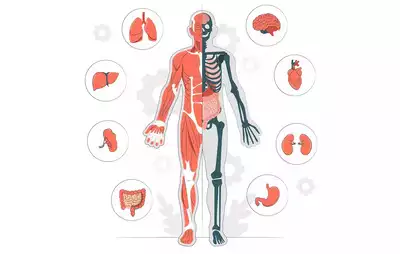- News
- Education News
- Learning with TOI News
- Physiology Explained: The study of how the human body works
Trending
This story is from June 14, 2023
Physiology Explained: The study of how the human body works
Physiology studies how the human body works, including the functions and interactions of its systems, cells, and organs, and the maintenance of homeostasis. It explores how the body adapts to different stimuli, such as exercise and stress, and helps to identify disruptions that can lead to disease.

Anatomy of human body (Image source: Freepik)
Physiology is the branch of science that focuses on understanding how the human body functions and how its different systems work together to maintain health and perform various activities. It explores the mechanisms, processes, and interactions that occur within the body to support life. Let's explore physiology in simple terms.
The human body is made up of several interconnected systems, such as the nervous system, cardiovascular system, respiratory system, digestive system, and musculoskeletal system.Physiology investigates how these systems work individually and collaboratively to ensure the body's proper functioning. For example, the respiratory system, consisting of the lungs and airways, is responsible for the exchange of oxygen and carbon dioxide, enabling the body to obtain oxygen and remove waste gases.
Physiology examines the functions of organs, which are composed of different types of tissues working together. It investigates how organs perform specific tasks and contribute to overall bodily functions. For example: The heart, an organ of the cardiovascular system, pumps blood throughout the body, delivering oxygen and nutrients to tissues and removing waste products.
Homeostasis refers to the body's ability to maintain a stable internal environment despite external changes. Physiology explores the mechanisms and feedback loops that regulate variables such as body temperature, blood pressure, pH balance, and hormone levels. For example, when body temperature rises, the body responds by sweating, which helps to cool down and maintain a stable temperature.
Physiology investigates how the body responds and adapts to different stimuli, including exercise, stress, and environmental factors. It explores the changes that occur in the body to meet increased demands or cope with challenges. For example, regular exercise can lead to adaptations in the cardiovascular system, such as increased heart strength and efficiency, to support greater physical activity.
Physiology plays a crucial role in understanding the normal functioning of the body and identifying disruptions that can lead to disease. It helps in diagnosing and treating medical conditions by uncovering underlying physiological abnormalities. For example, diabetes is a disease characterized by impaired insulin function, which affects the body's ability to regulate blood sugar levels.
In summary, physiology is the study of how the human body works. It explores the functions and interactions of body systems, cells, and organs, as well as the maintenance of homeostasis. By understanding physiology, scientists and healthcare professionals gain insights into normal bodily functions, disease processes, and strategies for promoting health and well-being.
(The content is generated with the assistance of Artificial Intelligence)
Body Systems
The human body is made up of several interconnected systems, such as the nervous system, cardiovascular system, respiratory system, digestive system, and musculoskeletal system.Physiology investigates how these systems work individually and collaboratively to ensure the body's proper functioning. For example, the respiratory system, consisting of the lungs and airways, is responsible for the exchange of oxygen and carbon dioxide, enabling the body to obtain oxygen and remove waste gases.
Cell Function
Physiology delves into the functions of individual cells, which are the building blocks of the body. It explores how cells carry out specialized tasks, communicate with each other, and maintain homeostasis (a stable internal environment). For example: Neurons, the cells of the nervous system, transmit electrical signals to communicate information throughout the body.
Organ Function
Physiology examines the functions of organs, which are composed of different types of tissues working together. It investigates how organs perform specific tasks and contribute to overall bodily functions. For example: The heart, an organ of the cardiovascular system, pumps blood throughout the body, delivering oxygen and nutrients to tissues and removing waste products.
Homeostasis
Homeostasis refers to the body's ability to maintain a stable internal environment despite external changes. Physiology explores the mechanisms and feedback loops that regulate variables such as body temperature, blood pressure, pH balance, and hormone levels. For example, when body temperature rises, the body responds by sweating, which helps to cool down and maintain a stable temperature.
Exercise and Adaptation
Physiology investigates how the body responds and adapts to different stimuli, including exercise, stress, and environmental factors. It explores the changes that occur in the body to meet increased demands or cope with challenges. For example, regular exercise can lead to adaptations in the cardiovascular system, such as increased heart strength and efficiency, to support greater physical activity.
Health and Disease
Physiology plays a crucial role in understanding the normal functioning of the body and identifying disruptions that can lead to disease. It helps in diagnosing and treating medical conditions by uncovering underlying physiological abnormalities. For example, diabetes is a disease characterized by impaired insulin function, which affects the body's ability to regulate blood sugar levels.
In summary, physiology is the study of how the human body works. It explores the functions and interactions of body systems, cells, and organs, as well as the maintenance of homeostasis. By understanding physiology, scientists and healthcare professionals gain insights into normal bodily functions, disease processes, and strategies for promoting health and well-being.
(The content is generated with the assistance of Artificial Intelligence)
End of Article
FOLLOW US ON SOCIAL MEDIA










